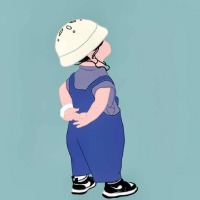 阿啵呲嘚
阿啵呲嘚 -
"Punks" and "skinheads" have long been synonymous in the public mind. Going back to the "70s in England, the two scenes have evolved simultaneously. Even within the skin culture there are conflicts on what it means to be a skin--the common thread in skinhead culture, however, is violence. The skinheads who embrace fascist beliefs use the violence to harass and abuse minorities, homosexuals, and on more than a few occasions, punks. Even the skins that are "anti-racist" have been known to use violence to intimidate those who oppose them.
"Punk" is harder to define. In We Owe You Nothing: The Collected Interviews, editor Daniel Sinker says "Punk has always been about asking "Why?"" Punk is about living on the outside. As a part of this, there is a politically and socially active segment of punks who are working to create some sort of just society. And it"s through this that I see the connections to the wider activist community. The Do-It-Yourself (DIY) ethic exists throughout both, whether it is expressed by putting out an independent record, doing grassroots organizing, or producing a magazine.
A crucial moment in my developing relationship with punk culture occurred during my freshman year in college, at about three in the morning. A friend of mine had a zine that he puts out with some of his friends back home. It was very social-justice-related, and also included a show review. I asked him how much of his identity as a punk was related to music. When he said "Very little," it was the first time I thought of punk as more than a music scene.
I kind of threw myself into the whole punk literature thing. It began at a book reading with Mark Anderson, the co-author of Dance of Days: Two Decades of Punk in the Nation"s Capital (Softskull Press, New York 2001)and Daniel Sinker, editor of Punk Planet magazine. Hearing these two people speak about how much this whole lifestyle meant to them, and how much more than music it was, was important, if only in clearing up my understanding. Craig O"Hara"s The Philosophy of Punk: More Than Noise (AK Press, San Francisco 1999) provided yet another view.
Punk Planet (www.punkplanet.com) is an amazing microcosm of politics, music, and opinions. In one issue, there were articles on a Canadian band, the fate of wild buffalo, and DIY pet care. Begun six years ago, Planet has become an excellent source for music reviews, interviews, and articles on timely political topics, including Iraq, the 2000 Presidential election, and hate crimes. The interviews are so good that there"s even a book of them, We Owe You Nothing. It includes interviews with progressive heroes, including Noam Chomsky, Voices in the Wilderness, and Central Ohio Abortion Access Fund, along with influential punk artists, musicians, and supporters.
Philosophy of Punk and Dance of Days go very well together. Philosophy goes subject by subject, with each chapter focusing on a topic such as environmentalism or anarchy, and with much overlap. Dance of Days is something more of a sociological study. It thoroughly documents Washington DC"s vibrant, and revolutionary, punk community.
The beginnings of Straight Edge, a youth movement that promotes abstinence from drugs, alcohol, and promiscuous sex, is well documented in Dance of Days. Its origins derive from Washington DC band Minor Threat and front man Ian MacKaye"s critique of the drug use and self-disrespect he saw around him, expressed in songs like 1981"s "Straight Edge" and "Out of Step." Philosophy takes a more critical, long-term look at this movement. To some, the Straight Edge of individual examination and self-definition has changed into a movement of political apathy and conformist attitudes.
Members of the band Riot Grrrl on stage at a Supreme Court protest, 1992. Photo: Pat Graham
The Riot Grrrl movement, one empowering women, also has roots in Washington DC. The original zine, Riot Grrrl, comes out of DC, along with a large number of female-based bands. Dance of Days and Philosophy also cover some of the more negative aspects of gender and sexual identity. Although the punk community considers itself, in some respects, to be different than mainstream society, sexism still exists, and it"s reflected in male-dominated bands, aggressive dancing, and the scarcity of women who are up front at the concerts. It"s through this that Riot Grrrl took shape, as a way for women to regain control in the scene. Homosexuals play an interesting role in some punk scenes. Zines such as Homocore have asserted "queers"" rightful place.
Short pieces of personal commentary by Mark Anderson and his co-author Mark Jenkins, are one of the most compelling aspects of Dance of Days. Both of them have been active in the DC scene, culturally as well as politically. Anderson discusses his involvement with Positive Force DC, a punk activist group that plays an important part in both Anderson"s life and DC in general. Positive Force organizes many benefits, protests, and other social actions.
By contrast,this summer, I attended the "Warped" tour. It"s an all-day concert, with most of the bands being punk-leaning. This was my first time going, and for the most part, the music was mediocre. There were a few standouts, like when Pennywise dedicated "Fuck Authority" to the Boston Police. Even with moments like those, however, I felt something was wrong, something was missing. First, the tour was sponsored by Target, a corporation with a not-so-great track record of social conscience. Bands trumpeted the importance of independent labels while on a corporate-sponsored tour. Even though it was nearly 100 degrees out, water was $2.50. Security was everywhere. There was not a single woman, on any stage, in any band. Thousands of people were watching a single stage. It was commercialized punk.
It was the Do-it-yourself ethic, social activism, and community that were missing. While it was amazing to be with 18,000 people who had some connection to punk, I don"t think it painted an accurate picture. I"m quite sure that more than a few stayed away because it was too commercial, or because punk is so much more than a huge concert.
 tt白
tt白 -
punk
[pQNk]
n.
废物, 小阿飞, 年轻无知得人
adj.
无用的, 低劣的
朋客, 崩客
